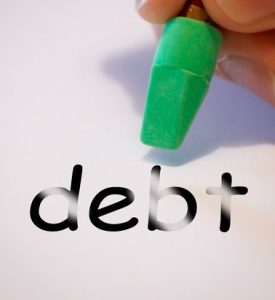Listed below are 5 free proven methods to help you get out of Credit Card debt.
Before reviewing the various methods of tackling your credit card debt it is important that you take a few important steps first.
How much do I owe? Actually sitting down and determining your outstanding balances is essential. You may be somewhat displeased when you add all the balances up and discover you owe a lot more than you thought. This is not uncommon for individuals and families that are juggling 5 or more credit cards.

Free Debt Settlement Advice by Debt Leap
Negotiate for lower rates. Once you have taken an inventory of what you owe, you will also be able to determine what your creditors are charging you for their money. Do not be afraid to contact your creditors and ask for a lower rate. If your payment history is perfect and you have had the card for some time, many creditors will reduce your rate, albeit, not all.
Waive the fees. Make certain there are no hidden fees associated with your credit cards. New legislation related to credit card issuers is supposed to stop this practice but many times you may have signed up for something you are not even aware was part of the package.
Consolidate Your Cards. If you have 2 or more cards from the same issuer, this does not bode well for you. If you are late on one, you may incur a late fee on all. If you are late on one, a potential rate hike may affect all of them. Many credit card issuers will give a high risk borrower several cards with limits of $250 to $500. This will allow them to increase rates on all the cards as well as add additional fees.
Now for the good stuff:
Card Prioritization: You can do this in two ways. Double up on your minimum payment or at least increase it substantially on the card with the smallest balance or tackle the card with the highest interest rate first. Going after the small balance card will give you a quicker feeling of accomplishment because you may be able to reduce its balance to zero in a very short time and then start working on cards 2 , 3 and so on. The cards with the highest interest rates are costing you more each month so it may be in your best interest to deal with them first. This is a decision you need to make based on your ability to make additional payments as well as outstanding balances.
Debt Management: A debt management program is tailor made for individuals or families who are concerned with maintaining their credit score as it will have little or no impact on it. In this program you will utilize the services of a third party to handle the payments to your creditors. This third party or Debt Management Company will negotiate reduced rates on each one of your credit cards and set you up on a payment plan that will accelerate your payoff time. Using this program enables you to make one payment in lieu of several and save you a great deal of money on interest expense. Keep in mind not all creditors participate in this type of program and the credit card issuers that do will no longer allow you to use the cards enrolled. In some instances your monthly payment will in fact be higher than what you are currently paying but that is part of the plan, to have you debt free in a fraction of the time.
Consolidation Loan: If you are eligible for such a loan it may be a way to take control of your debt. This comes with a very stern warning though. You are essentially replacing one debt with another and if you are not extremely disciplined, you may end up in a worse situation than you are now. Many people who have gone this route end up with not only the new consolidation loan but new credit cards. This happens much more often than you can imagine so take heed and be careful if you opt for this method.
Debt Settlement: Before considering this option ask yourself these questions first.
Am I 90 days or more behind on my credit card or unsecured loan payments?
If I am behind on my payments, do I see the ability to get caught up?
If I do not see the ability to get caught up, do I see my financial situation changing for the better in the near future?
A debt settlement program is not for everyone but if you answered yes to the questions above, it may be your best option. A debt settlement program will negotiate a repayment plan with your creditors where you will only be paying back a percentage of what you owe them. This percentage can range anywhere from 50% to 80%, depending on the creditor. (there are no guarantees of the actual amount you will pay back your individual creditors as each creditor determines the minimum they will accept) This program is not without its consequences though. It will not stop harassing calls, it will not guarantee the stoppage of legal action by your creditors and it will not benefit your credit score or ability to acquire new credit in the near future. Keep in mind, if you answered yes to the questions above, you are probably already receiving harassing calls, your credit score has already diminished greatly and if the creditor was thinking about legal action, it is probably already in process.
